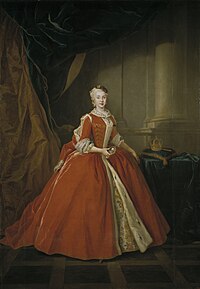Maria Amalia of Saxony
Maria Amalia of Saxony (24 November 1724 – 27 September 1760) was a Duchess of Saxony of the House of Wettin and wife of Charles III of Spain. Married to the then King of Naples, at the death of her brother in law Ferdinand VI of Spain, she became the queen of Spain. A cultured woman, she left a considerable architectural legacy in her adopted countries. She was also one of the shortest reigning queen consorts in Spanish history.
| Maria Amalia of Saxony | |||||
|---|---|---|---|---|---|
 Maria Amalia in Polish costume | |||||
| Queen consort of Spain | |||||
| Tenure | 10 August 1759 – 27 September 1760 | ||||
| Queen consort of Naples and Sicily | |||||
| Tenure | 19 June 1738 – 10 August 1759 | ||||
| Born | 24 November 1724 Dresden Castle, Dresden, Germany | ||||
| Died | 27 September 1760 (aged 35) Buen Retiro Palace, Madrid, Spain | ||||
| Burial | El Escorial, Spain | ||||
| Spouse | Charles III of Spain | ||||
| Issue | Infanta Maria Josefa Maria Luisa, Holy Roman Empress Felipe, Duke of Calabria Charles IV of Spain Ferdinand I of the Two Sicilies Infante Gabriel Infante Antonio Pascual | ||||
| |||||
| House | House of Bourbon House of Wettin | ||||
| Father | Augustus III of Poland | ||||
| Mother | Maria Josepha of Austria | ||||
| Religion | Roman Catholicism | ||||
Biography
changeShe was born at Dresden Castle in Dresden and was the eldest surviving the daughter of Frederick Augustus II, Elector of Saxony and Maria Josepha of Austria. She was one of 15 children and was baptised with the names Maria Amalia Christina Franziska Xaveria Flora Walburga.
Marriage
changeIn 1737 Maria Amalia became engaged to the King of Naples and Sicily, the future Charles III of Spain. The marriage was confirmed on 31 October 1737. The following year, 1738, at the age of 14, Maria Amalia married King Charles, on 19 June at Gaeta, a proxy wedding having taken place in May the same year with her brother, Frederick Christian of Saxony representing Charles.
Queen of Naples
changeThe couple resided in Naples and were very content. This marriage was looked upon favourably by the Holy See and effectively meant the conclusion of the diplomatic disagreement Charles and the See had had. Festivities lasted till 3 July. Maria Amalia was a very cultivated woman and played an important role in the construction of the Caserta Palace as well as the Palace of Portici, Teatro di San Carlo, Palace of Capodimonte as well as the Royal Palace of Naples. She also popularised Neapolitan porcelain at the "Capodimonte Porcelain Manufactory" in 1743. Maria Amalia was also a patron of the composer Gian Francesco Fortunati who was a favourite at the Neapolitan court. She ans Charles eventually had 13 children.
Queen of Spain
changeAt the end of 1758, Charles' half brother Ferdinand VI was displaying the same symptoms of depression that his their father used to suffer from. Ferdinand lost his devoted wife, Barbara of Portugal in August 1758 and would fall into deep morning for her. He named Charles his heir on 10 December 1758 before leaving Madrid to stay at Villaviciosa de Odón where he died on 10 August 1759. Charles was thus proclaimed the King of Spain under the name of Charles III and adicated as King of Naples as he could not join the three kingdoms of Spain, Naples and Sicily.
That same year they left Naples for Madrid, leaving two of their children behind in Caserta. Her third son became Ferdinand I of the Two Sicilies, while his elder brother Infante Charles was groomed in Spain to inherit the Spanish crown. Her oldest son the Duke of Calabria was mentally retarded and was thus could not inherit the thrones.
Charles and his wife arrived in Barcelona on 7 October 1759. Residing in Spain, Maria Amalia once again did much to improve the royal residences having them redecorated and founded another porcelain factory at "Buen Retiro". A popular queen, she died of tuberculosis at the Buen Retiro Palace outside the capital having been a heavy smoker. She was buried at the Royal Crypt in El Escorial.
Titles, styles, honours and arms
changeTitles and styles
change- 24 November 1724 – 17 January 1734 Her Serene Highness Duchess Maria Amalia of Saxony
- 17 January 1734 – 19 June 1738 Her Royal Highness Princess Maria Amalia of Saxony, Duchess in Saxony
- 19 June 1738 – 10 August 1759 Her Majesty The Queen of Naples and Sicily
- 10 August 1759 – 27 September 1760 Her Majesty The Queen of Spain
| Preceded by Vacant Elisabeth Christine of Brunswick-Wolfenbüttel |
Queen consort of Naples and Sicily 19 June 1738 – 10 August 1759 |
Succeeded by Vacant Archduchess Maria Carolina of Austria |
| Preceded by Vacant Infanta Barbara of Portugal |
Queen consort of Spain 10 August 1759 – 27 September 1760 |
Succeeded by Vacant Princess Maria Luisa of Parma |